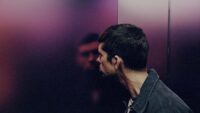The title of Cronenberg’s 1991 film, Naked Lunch, is taken from the book of the same name by William S. Burroughs. However, the film is more like a surreal biopic that plays with the events surrounding the book’s composition rather than a true adaptation of the novel. The story follows Bill Lee (Peter Weller), a writer working as an exterminator in New York City in the 1950s. One day, while spraying an apartment for roaches, he runs out of poisonous bug powder. He discovers his wife, Joan (Judy Davis), has been injecting herself with it. Soon after, Bill begins using the drug, and in a horrific accident, shoots Joan in the head, killing her instantly. Bill is taken into police custody and is interrogated by a talking typewriter. The typewriter has the body of a beetle which converses with him through a fleshy, hairy orifice resembling an anus. After some conversation, Bill smashes the typewriter with his shoe and escapes from the police station. With the help of his friends and a creature called Mugwump (voiced by Peter Boretski), Bill travels to the fictional North African city of Interzone. Bill’s drug use steadily increases, and his reality becomes more and more skewed. In Bill’s Interzone flat, the talking insect typewriter reappears and informs him that he is an agent on a mission. The bug begins giving him orders, some of which involve engaging in homosexual activities. He assures Bill that homosexuality is the best cover story for an agent.
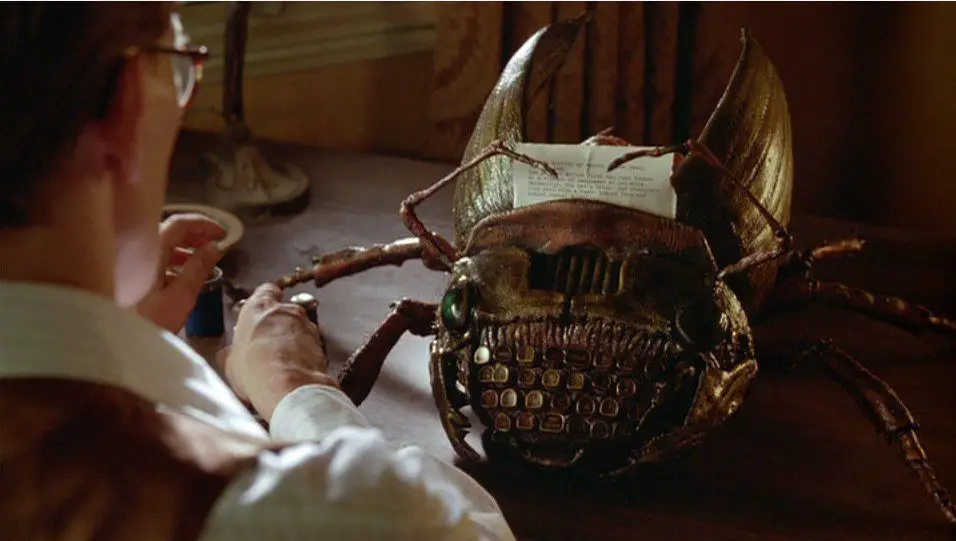
As the story unfolds in Interzone, Bill meets some new people, such as Hans (Robert A. Silverman) and Yves Cloquet (Julian Sands), but he also sees figures from his life in New York, including Mugwump, Dr. Benway (Roy Scheider), and most importantly, his wife Joan, now in the form of Joan Frost (still played by Judy Davis). After several gruesome and surreal experiences, Bill’s friends Hank (Nicholas Campbell) and Martin (Michael Zelniker) arrive from New York. Unbeknownst to Bill, he has been sending them pieces of a book called Naked Lunch, which they have been steadily editing and compiling. Before Hank and Martin leave, they encourage Bill to return to New York as soon as possible.
Eventually, Bill and Joan Frost leave Interzone. They travel to another fictional country called Annexia, and as they approach its border, Bill must prove to the border guards that he is a writer before they will allow him entry. Bill is forced to shoot Joan in the head, thus replicating the accidental murder from earlier in the film. As soon as she dies, Bill is granted entry into Annexia, and the film abruptly ends.
Whether you’ve seen Naked Lunch or not, it’s probably evident after reading this synopsis that the story is like a fever dream: fragmentary, jarring, and hallucinatory. As a viewer, you’re never quite sure what is happening, and other than Joan’s death, nothing is certain.
Naked Lunch’s “Passionate Ambivalence”
The initial impetus to write about Cronenberg’s Naked Lunch stemmed from my curiosity about the depictions of homosexual desire in the film. I wondered whether Naked Lunch was, intentionally or not, “straight washed” by David Cronenberg. But when I revisited the film, I realized my question was inadequate. The real (and more fruitful) question is “How are desire and sexuality depicted in this film?” Although there are many ways to answer this question, to me, it makes the most sense to begin by discussing ambivalence, which is explicitly mentioned several times throughout the film.
In psychological terms, ambivalence means “the coexistence within an individual of positive and negative feelings toward the same person, object, or action, simultaneously drawing him or her in opposite directions.” The world of Cronenberg’s Naked Lunch is filled with characters harboring ambivalent desires, and whenever these desires are expressed, they are either depicted in a surreal manner or are entirely omitted. I think the surreal depictions of sexual desire serve to emphasize and even amplify the uncomfortable, awkward, and even humorous quality of ambivalent desires.
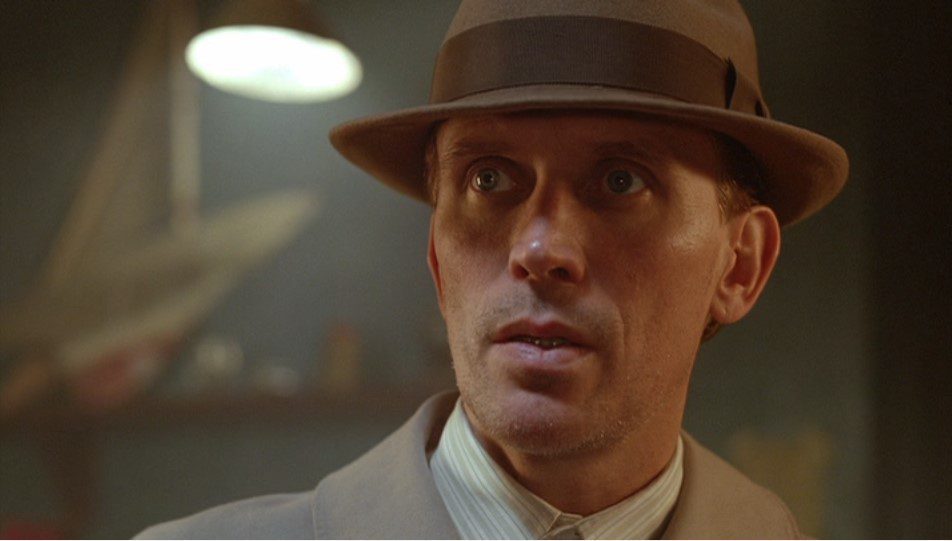
The omitted moments are more challenging to examine. They require us to imagine and intuit based on language and context rather than a literal or visual depiction of an event. For example, there is a scene in which Yves Cloquet tells Bill that he made quite an entrance with a group of Interzone boys at a party. But Bill does not remember this occurring and doesn’t seem to believe Yves. I think this omission epitomizes Bill’s defensiveness, ambivalence, and even his dissociation regarding his homosexual desires. As the film progresses, it becomes more and more likely that this event did indeed occur, but because the audience experiences Interzone from Bill’s perspective, we share his amnesia as well as his denial. This omission is part of the story itself, and the character of Bill Lee, rather than some directorial attempt to remove depictions of homosexuality from the film.
“Say, why don’t you and I join them?”
Early in the film, the Jack Kerouac-esque character, Hank (Nicholas Campbell), and Bill’s wife, Joan (Judy Davis) have sex on the couch in the Lee’s apartment. Hank’s bare buttocks are shown, Joan’s underwear is pulled down, but other than that they are completely clothed. Hank and Joan seem to be intoxicated, either from drugs, their desire for each other, or both. But they don’t quite kiss. Hank bites at her neck and her chin, and regardless of their positioning, they both appear completely uninterested in each other. The red-headed Allen Ginsberg clone, Martin (Michael Zelniker), stands over the copulating couple and reads his poetry aloud like a monotone preacher.
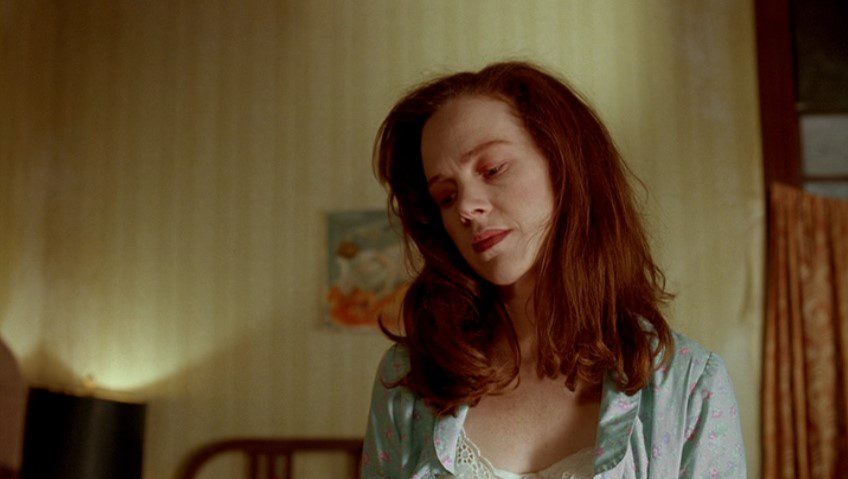
When Bill Lee enters the apartment, he sees Joan and Hank on the couch. He appears unbothered by what is happening. Then, Martin asks him, “Say, why don’t you and I join them?” Bill ignores him, walks into his room, and closes the door. Martin looks disappointed and perhaps feels ashamed for asking. The first time I watched this scene, I assumed that Bill was disgusted with the idea of being with Martin or the notion of a foursome that included two men and his wife. But it’s more complicated than that, because in the next scene, Bill and Joan have the following conversation about what happened on the couch.
Joan Lee: Hank and I were just bored. It wasn’t serious.
Bill Lee: I didn’t take it seriously. Where is Hank?
Joan Lee: Hank got embarrassed and left.
Bill Lee: Not before he came, I hope.
Joan Lee: Hank’s on junk, he doesn’t come.
Bill Lee: Not before you came, I hope.
Joan Lee: I’m on bug powder, I don’t need to come.
It seems each partner’s drug of choice was (probably) satiating their desire for pleasure, so what were they really doing? In retrospect, their behavior seems mindless and robotic: two people searching for an unreachable climax. They are simultaneously on top of each other and completely disinterested in one another, yet they continue to “search” until Bill interrupts them. As Joan said, their behavior stemmed from boredom, so in truth, nothing intimate was happening. In this scene, Bill’s true desires are obscured. Does he want Joan for himself? Or Martin, Hank, or some other combination? Or does he just want solitude? It remains unclear. I don’t think a single interpretation of this scene is possible, because too much is happening. There are at least four systems of desire operating in that room, and as far as we know, everyone is on some sort of drug. So, the question is, are these desires even real? And are the characters’ desires inhibited or amplified by their drug of choice? My assumption is that regardless of their substance use or their actions, the ambivalence, and perhaps confusion, remains.
“He’s called Mugwump.”
Before Bill leaves for Interzone, he sits at bar with Kiki (Joseph Scorsciani), a younger gay man. This scene begins with Bill coughing several times. Kiki observes him for a few moments, then asks, “Are you a f*ggot?” Bill pauses, then says, “Not by nature, no. I am not. I wouldn’t say f*ggot. However, circumstances have forced me to consider the possibility that—” Bill does not finish his thought. Then, Kiki says, “I’d like you to meet a friend of mine. He specializes in sexual ambivalence.” Bill drolly responds, “Sexual ambulance, did you say?” (Bill cannot even hear the word “ambivalence.”) Then, Bill sees the massive alien creature sitting on the bar stool. Kiki says, “He’s called Mugwump,” and walks away. But for the remainder of the scene, Kiki observes their interactions from across the room.
In this film, Kiki is many things. He is like the personified extension and/or expression of Bill’s desire for other men, in its most tender, innocent form. Throughout Naked Lunch, Kiki also functions as a kind of intermediary: he connects Bill with Mugwump and in doing so indirectly helps him travel to Interzone. As a group, perhaps Kiki and his boyfriends represent the uncloseted expression of homosexuality which Bill watches (and perhaps yearns for) from a distance. But Bill is ambivalent about them, and about Kiki. He is drawn to them, but he never gets too close. And yet, he does get close to them on at least one occasion, he just doesn’t remember it.
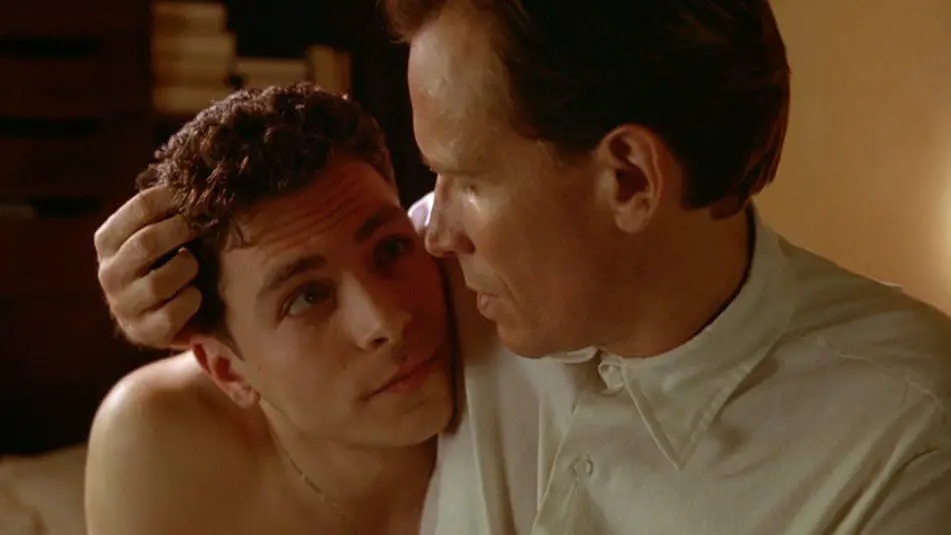
Much later, Mugwump reappears in Bill’s Interzone flat. After their short conversation, Bill turns around a corner. Suddenly he is sitting in bed with Kiki, who emerges from beneath the sheets wearing only his underwear. Bill thanks him for the new typewriter (Mugwump). Kiki says, “I’m very proud to be your friend, you know? Very proud that I can help you to be a writer.” Bill says, “You have done that, Kiki, you really have.” So, here is another scene in which Kiki and Mugwump appear together: the child-like, handsome gay man and the bizarre monstrosity who “specializes in sexual ambivalence.” In Bill’s world, it seems that one cannot exist without the other. I think it’s also worth noting that Kiki does not say lover or boyfriend, but “friend.” The platonic label implies ambivalence and hesitancy in declaring that their relationship is romantic. But perhaps Bill can only love a man as a friend, even if they have a sexual relationship.
After this scene, Bill and Kiki are driven by Yves Cloquet (Julian Sands) to Yves’s house, where he essentially pounces on Kiki as soon as Bill leaves the room. In a sense, Kiki is given, as if prostituted, to Cloquet. Bill abandons Kiki, but soon after walks in on them together. He discovers them standing inside of a giant bird cage: Yves has transformed into a gigantic fleshy centipede-like creature who is wrapped around Kiki. The Yves-centipede-monster is crushing Kiki’s face with his strange insect arms. Kiki’s expression is frozen in a scream, and his face is dripping with blood. The scene is brief, monstrous, and ambiguous. I wondered if Bill experienced Yves’s sexual desire as aggressive or even monstrous, and due to his constant state of inebriation, his mind conjured an image of violence and madness.
Overall, I think Bill is ambivalent about not only who he desires, but the power of sexual desire itself. He is attracted to its sensuality and its pleasure, yet horrified by it because it can pull him out of his overly rational, emotionless state and throw him into the irrational, inescapable immediacy of bodily experience. Perhaps that is why sexuality is almost always depicted in conjunction with alien or insectoid monstrosities throughout the film.
Quiet Love in Naked Lunch
When Hank and Martin travel to Interzone to check on Bill, they find him passed out in a pile of sand, clutching a large pillowcase. Bill says the pillowcase is filled with the pieces of his last writing machine. Martin and Hank look inside and find dozens of pill bottles and various medical paraphernalia. At this moment, Bill realizes he has been writing a book and mailing it to Hank and Martin, who have been piecing it together for him. This scene makes it clear: Hank and Martin love Bill. Their appearance infuses his world with a much-needed dose of consensus reality. Their presence reminds the audience that people can and do openly care for each other without ambivalence. This scene also reinforces the fact that Bill’s ability to experience intimacy is limited to relationships with friends, rather than lovers.
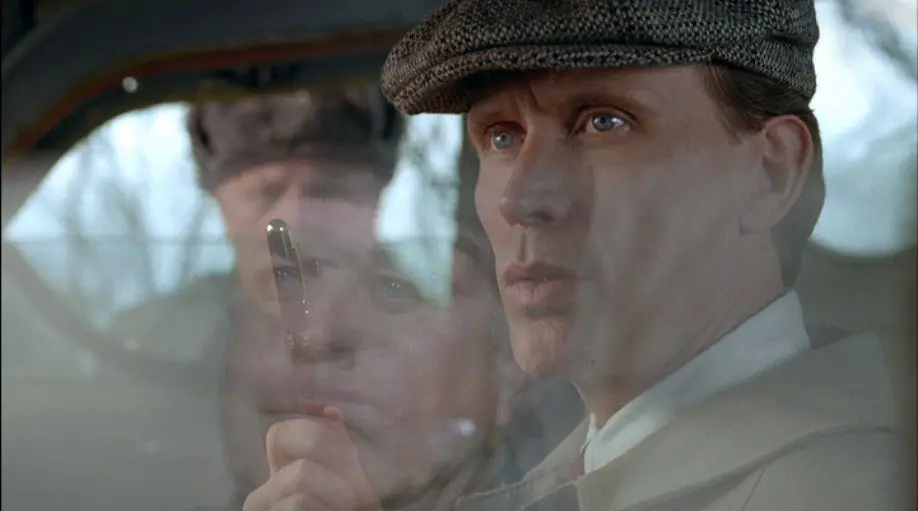
Bill’s ambivalence, that is, his fascination with and fear of sexuality permeates the film, and is depicted via hallucinatory, sometimes monstrous, imagery. But beneath the surreal unreality of Naked Lunch is a story about guilt, denial, and confusion after hurting someone you love in an irreversible manner. It’s about a man who struggles to carry unbearable guilt while still preserving his quiet love for a woman he lost.

